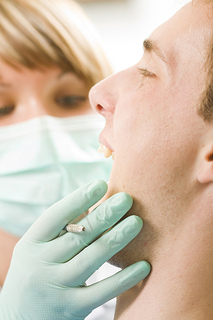Headaches, TMJ, and Dentistry
May 6th, 2016

That ache in your head may stem from your jaw. If your jaw falls out of alignment, you could have temporomandibular joint disorder, or TMD.
It's not clear what causes TMD. Obesity may factor in. Stress and pressure on the jaw may also contribute. A misaligned bite (that is, where your upper and lower teeth don't fit together when you close your mouth) may cause TMD symptoms, too.
TMD can affect your life and your health by making it painful to eat and hard to sleep. Some people find the nagging pain difficult to bear.
Symptoms of TMD include:
- Recurring headaches with no other cause
- Pain along and behind your ears
- Pain in your cheeks or lower face
- Clicking noises when you talk or chew
- Tired or sore jaw muscles after eating
- Limited jaw movement
If you experience the symptoms listed here, make an appointment with our office. We’ll take an X-ray to look at your bite, and determine if TMD could be the culprit. If you have TMD we can offer a number of treatments, including:
- Relaxation and stress reduction techniques
- Pain reduction recommendations, which might involve visualization or medication
- Jaw joint exercises that can help reduce stress and improve your alignment
Left untreated, TMD headaches and other symptoms can become quite severe. If you suffer the symptoms of TMD, you do not have to live in pain. Make an appointment at our Zeeland, MI office to learn how we can reduce your pain and restore comfort to your life.

 Patient Login
Patient Login




 Back to top
Back to top Website Powered by Sesame 24-7™
Website Powered by Sesame 24-7™